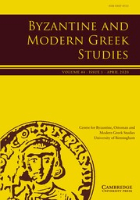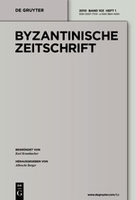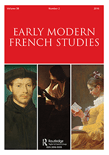
BYZANTINE AND MODERN GREEK STUDIES
Scope & Guideline
Exploring the Rich Tapestry of Greek Heritage
Introduction
Aims and Scopes
- Byzantine History and Culture:
The journal extensively covers the political, social, and cultural developments of the Byzantine Empire, examining its influence on subsequent periods and cultures. - Modern Greek Studies:
It explores the evolution of Greek identity, literature, and culture from the Byzantine era to contemporary times, emphasizing the connections between historical events and modern societal dynamics. - Art and Visual Culture:
The journal publishes research on Byzantine and modern Greek art, including iconography, architecture, and the role of art in cultural identity and expression. - Interdisciplinary Approaches:
Emphasizing a blend of methodologies, the journal encourages contributions that incorporate history, literary analysis, and cultural studies to provide a comprehensive understanding of topics. - Political and Social Dynamics:
Research often focuses on the interplay between politics and society in both Byzantine and modern contexts, including studies on governance, law, and social structures. - Linguistic and Literary Analysis:
The journal features analyses of Greek language evolution, literature, and poetry, highlighting significant authors and movements throughout history.
Trending and Emerging
- Cultural Interactions and Global Perspectives:
There is a growing interest in exploring how Byzantine and modern Greek culture interacts with other cultures, reflecting a trend towards global perspectives in historical analysis. - Gender Studies and Female Agency:
Recent research increasingly highlights women's roles and agency in both Byzantine and modern contexts, addressing issues of social capital, representation, and artistic contributions. - Queer Studies and Identity:
The exploration of queer identities within the context of Greek culture, particularly in modern literature and film, is emerging as a significant area of study, reflecting broader societal changes. - Environmental and Ecological Perspectives:
Scholarly work is beginning to incorporate environmental history and ecological considerations, examining the relationship between culture, identity, and the natural world. - Modernity and Postmodernity in Greek Culture:
There is an increasing focus on the implications of modernity and postmodernity within Greek literature, art, and society, analyzing how these concepts shape contemporary Greek identity.
Declining or Waning
- Traditional Byzantine Literature:
There has been a noticeable decrease in studies focusing on classical Byzantine literature, such as epic poetry and historical texts, as more contemporary themes and methodologies gain traction. - Static Historical Narratives:
Research that presents a linear or static view of Byzantine history is becoming less prominent, with a shift towards more dynamic and multifaceted approaches that consider cultural interactions and complexities. - Narrow Nationalistic Perspectives:
Papers that emphasize a strictly nationalistic interpretation of Greek history are waning, as scholars increasingly adopt transnational and comparative frameworks in their analyses. - Iconography and Symbolism Analysis:
While still relevant, studies focused solely on iconographic analysis without contextual historical or cultural discussions are being published less frequently. - Focus on Medieval Religious Practices:
Research on specific medieval religious practices, particularly those that do not connect to broader social or political themes, has seen a decline, indicating a shift towards studies that integrate multiple dimensions.
Similar Journals

BYZANTINISCHE ZEITSCHRIFT
Celebrating Over a Century of Byzantine Research ExcellenceBYZANTINISCHE ZEITSCHRIFT, an esteemed publication founded in 1892, is dedicated to advancing the study of Byzantine history, literature, and the arts. Published by WALTER DE GRUYTER GMBH in Germany, this journal holds a significant place in academic discourse, evidenced by its Q2 quartile ranking in both Literature and Literary Theory, and Visual Arts and Performing Arts, as well as its Q3 ranking in History according to the 2023 category quartiles. The journal is highly regarded for its contributions to scholarly discussions and features a diverse range of articles that appeal to researchers, professionals, and students alike. With its deep historical roots and a commitment to quality scholarship, BYZANTINISCHE ZEITSCHRIFT remains a crucial resource for anyone interested in the multifaceted dimensions of the Byzantine era, covering converged years from 1892 to 2024. Engage with this journal to explore the complex narratives and rich heritage of Byzantine culture and its lasting impact on contemporary scholarship.

Minerva-Revista de Filologia Clasica
Connecting scholars in the pursuit of knowledge.Minerva-Revista de Filologia Clasica, an esteemed academic journal published by the Universidad de Valladolid, is a pivotal resource in the fields of Classics, Linguistics, and Literature. With its ISSN 0213-9634 and E-ISSN 2530-6480, this journal has been championing open access since 2017, making high-quality research accessible to a global audience. Based in Valladolid, Spain, Minerva is dedicated to the exploration and dissemination of scholarly work related to classical philology, offering a platform for the exchange of ideas among researchers, educators, and students alike. Recognized in the 2023 category quartiles as Q3 in Classics and Q4 in Linguistics and Language, this journal provides valuable insights and contributes significantly to its fields, allowing authors and readers to engage with important discussions and innovative perspectives. As the academic landscape evolves, Minerva continues to adapt, fostering a vibrant community committed to the advancement of knowledge in antiquity and its linguistic dimensions.

Palaeohispanica-Revista sobre Lenguas y Culturas de la Hispania Antigua
Fostering Insight into Iberia's Linguistic and Cultural EvolutionPalaeohispanica-Revista sobre Lenguas y Culturas de la Hispania Antigua is a distinguished academic journal dedicated to the study of ancient Spanish languages and cultures. Published by the INST FERNANDO CATOLICO in Spain, this journal serves as an essential platform for scholars and researchers exploring the rich historical and linguistic heritage of Iberia. With a specific focus on the intersections of archaeology, history, linguistics, and cultural studies, Palaeohispanica has garnered substantial recognition, reflecting its commitment to high-quality research as evidenced by its rankings in prominent Scopus categories, reaching the 80th percentile in History and the 69th in Archaeology. While the journal operates without an Open Access option, it continues to contribute significantly to the academic discourse surrounding ancient Hispania from 2019 to 2023, ensuring that vital research is accessible to a discerning audience. As a Q3 and Q2 ranked publication in various relevant categories, it is an invaluable resource for professionals, researchers, and students eager to delve into the complexities of ancient languages and cultures.

Journal of Greek Linguistics
Connecting Language, Culture, and Society in Greek StudiesThe Journal of Greek Linguistics, published by BRILL, is a premier platform dedicated to advancing the study of Greek language and its historical and contemporary implications within the broader field of linguistics. With an impact factor recognized in the linguistics community, this journal significantly contributes to the academic discourse surrounding Greek linguistics and its relevance in cultural and social studies. First made open access in 2016, it is now accessible to a global audience, facilitating a collaborative environment for researchers, scholars, professionals, and students alike. The journal is proudly positioned in the Q2 quartile for linguistics and language, reflecting its esteemed standing in the academic community, and it ranks within the top 30% in both the Arts and Humanities and Social Sciences categories according to Scopus. With a focus on the intersection of language, culture, and society, the journal invites contributions that offer new insights and promote interdisciplinary research. The Journal of Greek Linguistics continues to be an essential resource for those engaged in the rich and evolving conversation about the Greek language.

GREEK ROMAN AND BYZANTINE STUDIES
Championing Interdisciplinary Dialogues in Classical StudiesGREEK ROMAN AND BYZANTINE STUDIES, published by DUKE UNIVERSITY, is a leading journal dedicated to the exploration of ancient Greek and Roman civilizations as well as Byzantine history. With its ISSN 0017-3916 and E-ISSN 2159-3159, this prestigious journal has established itself as a vital platform for interdisciplinary research, boasting an impact factor worthy of recognition in the academic community. Since its transition to Open Access in 2004, GREEK ROMAN AND BYZANTINE STUDIES has enhanced the accessibility of scholarly work, fostering a collaborative environment for researchers, students, and professionals alike. Ranked in the Q2 category in Classics and History, and Q3 in Cultural Studies, this journal continues to be an essential resource for those investigating the philosophical, historical, and cultural dimensions of ancient societies. With a focus on innovative research and critical scholarship, GREEK ROMAN AND BYZANTINE STUDIES stands as a cornerstone for advancing knowledge and understanding within these influential fields.

GLOTTA-ZEITSCHRIFT FUR GRIECHISCHE UND LATEINISCHE SPRACHE
Illuminating the Richness of Classical LanguagesGLOTTA-ZEITSCHRIFT FUR GRIECHISCHE UND LATEINISCHE SPRACHE, published by Vandenhoeck & Ruprecht GmbH & Co KG, stands as a pivotal academic journal within the field of Classics and Linguistics, demonstrating a strong commitment to advancing scholarly discourse surrounding the Greek and Latin languages. With a respectable Scopus ranking placing it in the top 77th percentile for Classics, this journal facilitates the dissemination of high-quality research and insights relevant to linguists, philologists, and historians alike. The journal operates without an open access model, ensuring its niche scholarship remains exclusive yet profoundly impactful. The HIndex is indicative of its longstanding influence, with the journal traces its roots back to its inception, with weighted contributions across several pivotal years. Furthermore, the journal's current standing—positioned in the Q2 quartile for Classics and Q3 quartile for Linguistics—reflects its thriving relevance and aspiration towards academic excellence, offering a significant platform for the exchange of ideas within the global scholarly community. Researchers, professionals, and students are encouraged to engage with the journal's contributions, as it consistently reflects the evolving dialogue in the study of ancient languages.

Deltion of the Christian Archaeological Society
Bridging Disciplines: Understanding Faith Through ExcavationDeltion of the Christian Archaeological Society (ISSN: 1105-5758, E-ISSN: 2241-2190), published by the Christian Archaeological Society in Athens, Greece, stands as a pivotal source of scholarly work within the realm of Christian archaeology. This journal is dedicated to disseminating high-quality research that promotes the understanding of Christian history, heritage, and archaeological practices. Though it operates under traditional access options, it provides a comprehensive platform for researchers and professionals alike, fostering dialogue and collaboration within the archaeological community. With a commitment to advancing knowledge, the Deltion aims to support both established scholars and emerging voices, reinforcing the significance of archaeology in interpreting religious narratives and cultural contexts. Researchers, students, and professionals interested in the intersections of archaeology, history, and theology will find this journal an invaluable resource in their scholarly pursuits.

Byzantinoslavica-Revue Internationale des Etudes Byzantines
Illuminating Intersections of Culture and HistoryByzantinoslavica-Revue Internationale des Etudes Byzantines is a leading academic journal published by the SLOVANSKY USTAV AKAD CESKE REPUBLIKY, dedicated to the rich field of Byzantine and Slavic studies. Established in 1972, this esteemed publication has become a valuable resource for researchers, professionals, and students alike, providing insightful articles that delve into various aspects of cultural, historical, linguistic, and literary studies concerning the Byzantine heritage and its impact on Slavic cultures. With its current Scopus rankings, including a Q4 categorization in Cultural Studies, History, and Linguistics and Language, the journal reflects its steadfast commitment to advancing research in these important fields, despite its relatively modest impact factors. Located in the heart of Prague, this journal fosters an academic environment that encourages interdisciplinary dialogue and collaboration. While it operates without open access options, it continues to serve as a crucial platform for scholarly exchange and the dissemination of knowledge within the global academic community.

Vizantiiskii Vremennik
Delving into the Depths of Byzantine HistoryVizantiiskii Vremennik is a prestigious academic journal dedicated to the field of Byzantine studies, published by the esteemed ROSSIISKAYA AKAD NAUK, IZDATELSTVO NAUKA. With its ISSN 0132-3776, this journal serves as a vital platform for scholarly discourse, exploring the rich historical, cultural, and artistic legacy of the Byzantine Empire. Despite the absence of open access options, Vizantiiskii Vremennik provides valuable insights through meticulously peer-reviewed articles, making it essential reading for researchers, historians, and students engaged in classical studies and related disciplines. The journal prides itself on fostering a deeper understanding of Byzantine civilization, promoting interdisciplinary approaches, and contributing to the broader research community dedicated to this pivotal era in history. The publication's commitment to high academic standards ensures its importance in the scholarly landscape, making it a recommended source for anyone pursuing knowledge in this influential field.

Early Modern French Studies
Navigating the Intricacies of French Cultural EvolutionEarly Modern French Studies (ISSN: 2056-3035; E-ISSN: 2056-3043), published by Routledge Journals, Taylor & Francis Ltd, is an essential academic journal that delves into the complexities of early modern French culture, literature, and history. With a focus on interdisciplinary approaches, this journal offers scholars a platform to engage with the evolving dynamics of French studies from 2015 to 2024. Despite its current Q4 ranking in the categories of Cultural Studies, History, and Literature and Literary Theory, Early Modern French Studies seeks to elevate discussions and research that illuminate the richness of the early modern period. While offering traditional subscription options, the journal encourages submissions that challenge prevailing narratives and foster innovative dialogues within the field. This journal is crucial for anyone looking to contribute to or gain insights into the intricate tapestry of early modern French scholarship.